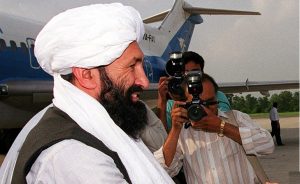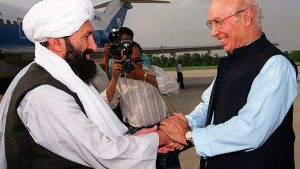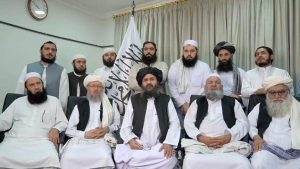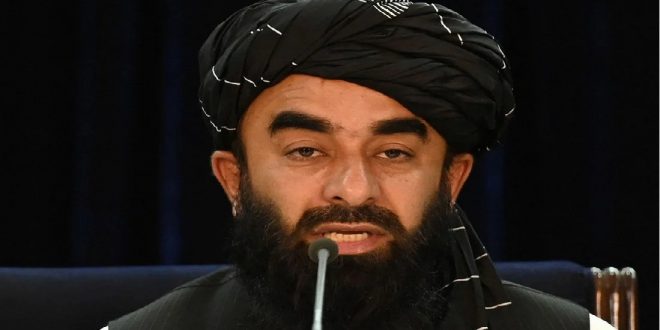08-09-2021
By SJA Jafri + Bureau Report + Agencies
 KABUL/ ISLAMABAD: The Taliban has appointed Mohammad Sasan Akhund a close aide to the group’s late founder Mullah Omar, as head of Afghanistan’s new caretaker government, weeks after it took control of the country in a rapid offensive.
KABUL/ ISLAMABAD: The Taliban has appointed Mohammad Sasan Akhund a close aide to the group’s late founder Mullah Omar, as head of Afghanistan’s new caretaker government, weeks after it took control of the country in a rapid offensive.
The list of cabinet members announced by chief spokesman Zabihullah Mujahid on Tuesday was dominated by members of the group’s old guard, with no women included.
Abdul Ghani Baradar, the head of the Taliban’s political office, will be the deputy leader while Sirajuddin Haqqani, son of the founder of the Haqqani Network, has been named as interior minister.
Mullah Mohammad Yaqoob, son of Mullah Omar, has been named as defence minister. Hedayatullah Badri will be the acting minister of finance, while Amir Khan Muttaqi, a Taliban negotiator in Doha, was named foreign minister.
“The Islamic Emirate decided to appoint and announce a caretaker cabinet to carry out the necessary government works,” said Mujahid, who named 33 members of “the new Islamic government” and said the remaining posts will be announced after careful deliberation.
 Speaking at a news conference in the Afghan capital, Kabul, Mujahid stressed the cabinet was an “acting” government and that the group will “try to take people from other parts of the country”.
Speaking at a news conference in the Afghan capital, Kabul, Mujahid stressed the cabinet was an “acting” government and that the group will “try to take people from other parts of the country”.
Akhund, the acting prime minister, is on a United Nations sanctions list.
Hailing from Kandahar, the birthplace of the Taliban, Akhund was previously the foreign minister and then deputy prime minister during the group’s last stint in power from 1996 to 2001.
He is the longtime chief of the Taliban’s powerful decision-making body Rehbari Shura, or leadership council.
Haqqani, the new interior minister, is the son of the founder of the Haqqani network, designated as a “terrorist” organisation by the United States. He is one of the FBI’s most wanted men.
Sources said many of the appointments involved “old faces”.
“It’s also important to say that a lot of these names, the vast majority of them are actually Pashtun and are not taking into consideration, arguably critics would say, the vast great ethnic diversity of this country.”
 Commenting on the Taliban’s announcement, Obaidullah Baheer, of the American University of Afghanistan, said it did not do “their cause for international recognition any favours”.
Commenting on the Taliban’s announcement, Obaidullah Baheer, of the American University of Afghanistan, said it did not do “their cause for international recognition any favours”.
“The amount of time spent wasn’t on discussing or negotiating inclusivity or potential power sharing with other political parties. That time was spent on knowing how to split that pie amongst their own ranks,” Baheer told Al Jazeera from Kabul.
The Taliban, which seized Kabul on August 15 in a lightning push that removed the Western-backed president, has been expected to announce a government since the US-led evacuation of foreign forces was completed at the end of August.
The group had promised an “inclusive” government that represents Afghanistan’s complex ethnic makeup – though women are unlikely to be included at the top levels.
In a statement on Tuesday, Mullah Haibatullah Akhunzada, the Taliban’s supreme leader, said the new government will work towards upholding sharia law in Afghanistan.
“I assure all the countrymen that the figures will work hard towards upholding Islamic rules and sharia law in the country,” Akhundzada said.
He told Afghans the new leadership would ensure “lasting peace, prosperity and development”, adding that “people should not try to leave the country”.
 “The Islamic Emirate has no problem with anyone,” he said.
“The Islamic Emirate has no problem with anyone,” he said.
“All will take part in strengthening the system and Afghanistan and in this way, we will rebuild our war-torn country.”
In response to the Taliban announcement, the United States said it was concerned about the “affiliations and track records” of some of the people named to government.
“We also reiterate our clear expectation that the Taliban ensure that Afghan soil is not used to threaten any other countries and allow humanitarian access in support of the Afghan people,” a State Department spokesman said in a statement.
United Nations spokesperson Farhan Haq told reporters in New York that only a “negotiated and inclusive settlement will bring sustainable peace to Afghanistan”.
Meanwhile, Turkey’s President Recep Tayyip Erdogan said he would closely follow the new government’s future course. saying he did not know how long the new government’s current makeup would last.
“As you know just now, it’s hard to call it permanent, but an interim cabinet has been announced,” Erdogan told reporters during a joint media appearance with visiting DR Congo President Felix Tshisekedi.
 Pressmediaofindia
Pressmediaofindia




